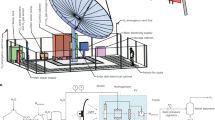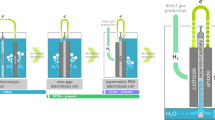Abstract
Two methods not involving fossil fuels for manufacturing hydrogen have been suggested as a basis for an eventual hydrogen economy: first, electrolysis of water using nuclear (or ultimately solar, geothermal or thermonuclear) electricity and, second, thermochemical cycles using nuclear heat, in general from a high temperature reactor2,3. In the thermochemical processes, a series of chemical steps is envisaged that will allow the differential splitting of the H2O molecule by means of reactions at different temperatures and with appropriate thermodynamic requirements to give high efficiency. The sequence of reactions, ideally of gas–solid type, acts as an adsorption–desorption-cycle heat engine. For economic hydrogen production, high thermal efficiency combined with low capital investment cost is necessary. The question is whether a system constructed on the basis of a sequence of chemical reactions will be more efficient (and ultimately less costly) than one based on a heat engine producing electricity, followed by electrolysis. Here I shall examine briefly some aspects of the efficiency of both approaches.
This is a preview of subscription content, access via your institution
Access options
Subscribe to this journal
Receive 51 print issues and online access
$199.00 per year
only $3.90 per issue
Buy this article
- Purchase on Springer Link
- Instant access to full article PDF
Prices may be subject to local taxes which are calculated during checkout
Similar content being viewed by others
References
Gregory, D. P., Ng, D. Y. C., and Long, G. M., The Electrochemistry of Cleaner Environments (edit. by Bockris, J. O'M.) (Plenum, New York, 1971).
Funk, J. E., and Reinstrom, R. M., Ind. Engng Chem. Proc. Des. Dev., 5, 366 (1966).
DeBeni, G., and Marchetti, C., EuroSpectra 9, 46 (1970).
Funk, J. E., Proc. ACS Symposium on No Fossil Fuels, 79 (Boston Massachusetts, 1972).
A Hydrogen Energy Carrier (edit. by Savage, R., et al.) 31 (NASA/ASEE Engineering Systems Design Institute, Houston, Texas, 1973).
Pangborn, J. B., and Sharer, J. C., Proc. Miami Hydrogen Energy Conf., S11-35 (March 1974).
Van Rysselberghe, P., J. chem. Phys., 29, 640 (1958).
Author information
Authors and Affiliations
Rights and permissions
About this article
Cite this article
APPLEBY, A. Efficiencies of electrolytic and thermochemical hydrogen production. Nature 253, 257–258 (1975). https://doi.org/10.1038/253257a0
Received:
Revised:
Issue Date:
DOI: https://doi.org/10.1038/253257a0
Comments
By submitting a comment you agree to abide by our Terms and Community Guidelines. If you find something abusive or that does not comply with our terms or guidelines please flag it as inappropriate.



